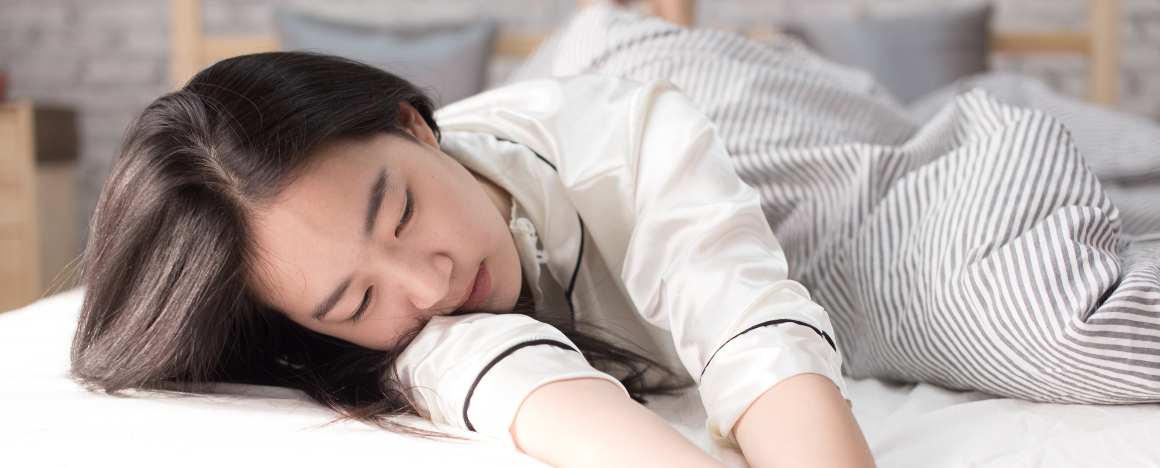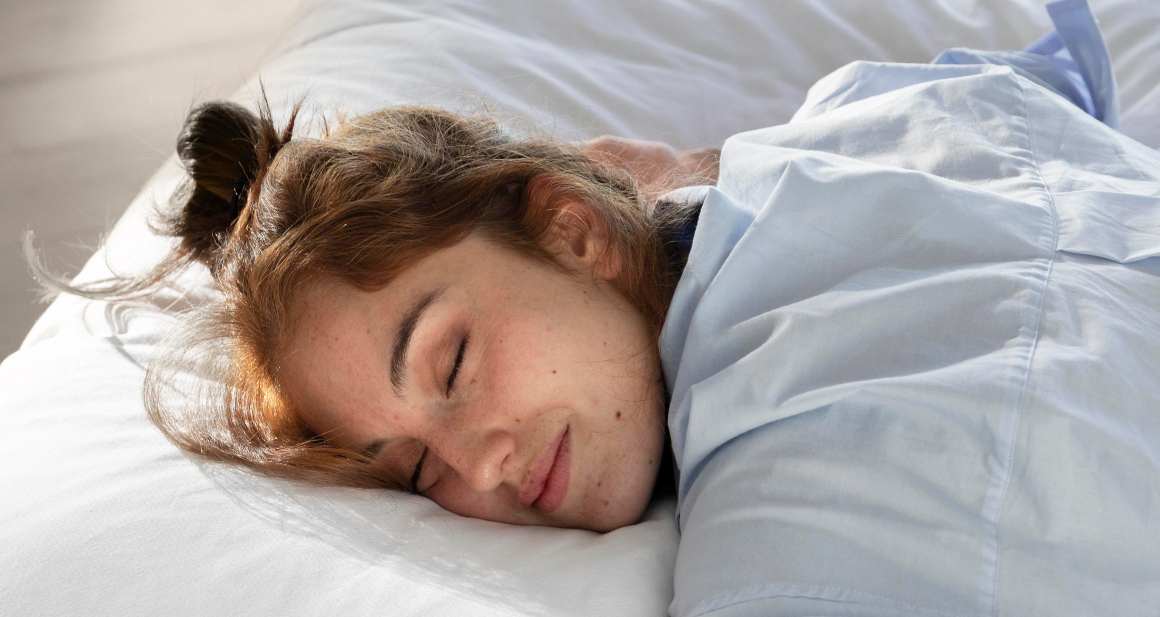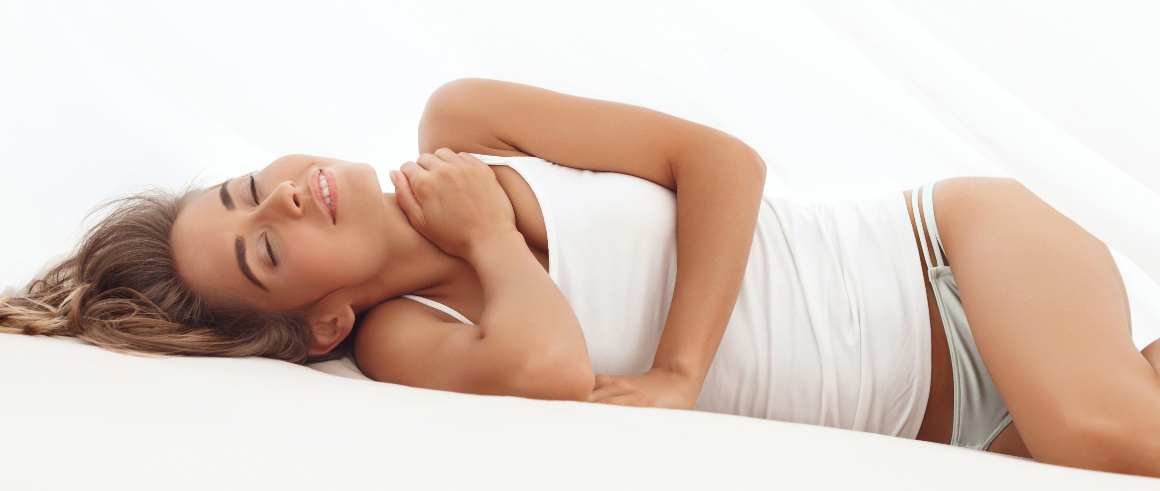Sleeping Without a Pillow: Pros, Cons, and Recommendations
Published:
When it comes to slumbering without a cushion, various elements must be taken into account for ensuring the most suitable comfort and backing of one's body. In this blog post, we will delve into the effects of pillow-free sleep on spinal alignment, neck tension, and personal preferences based on different sleep positions.
Contents:
- The Impact of Sleeping Without a Pillow
- Effects on Spinal Alignment and Posture
- Reduction in Neck Tension for Stomach Sleepers
- Potential Impact on Wrinkle Formation
- Sleep Positions and Pillow Use
- Special Considerations for Specific Conditions
- Types of Pillows Available Today
- Healthy Habits That Improve Sleep Quality
- FAQs in Relation to Sleeping Without a Pillow
- Conclusion
Furthermore, we will discuss the various types of pillows recommended for side sleepers, back sleepers, and stomach sleepers. We'll also explore clinical alternatives such as thin pillows for scoliosis patients or water-based options that offer improved support.
In addition to these considerations surrounding pillowless sleeping itself, we'll address skin health concerns related to pillow use including wrinkles caused by certain materials and dust mites contributing to acne breakouts. Finally, you'll find tips on choosing the right pillow based on factors like adequate neck support and balancing comfort with spinal alignment while maintaining healthy sleep habits for improved slumber quality overall.

The Impact of Sleeping Without a Pillow
Without the use of a pillow, one's sleep quality and overall health may be impacted. This practice may provide benefits such as maintaining proper spinal alignment, reducing neck tension, and potentially minimizing the development of wrinkles due to skin compression during slumber. In this part, we will delve deeper into the possible advantages of sleeping without a pillow.
Effects on Spinal Alignment and Posture
Proper spinal alignment is crucial for maintaining good posture throughout the day and avoiding discomfort or pain while sleeping. When you sleep without a pillow, your head lies flat on the mattress, which can help maintain natural curvature in your spine. This pillow-free sleep setup might be particularly beneficial for stomach sleepers who often experience neck strain when using thick pillows that force their heads into unnatural angles.
Reduction in Neck Tension for Stomach Sleepers
Stomach sleepers don't always need regular pillows, as they can cause unnecessary stress on their necks by elevating their heads too much. By going completely pillowless or opting for a thin pillow instead of a soft or firm one, stomach sleepers can reduce neck tension significantly while still enjoying comfortable rest each night.
- Pillowless sleeping: Removing the pillow altogether allows stomach sleepers to keep their head level with the rest of their body during slumber.
- Thin pillow: A thinner option provides just enough support to cradle the head without causing strain on the neck muscles.
Potential Impact on Wrinkle Formation
Although more research is needed to confirm this theory, some experts believe that sleeping without a pillow might help reduce wrinkle formation by minimizing skin compression during sleep. When you use a regular or thick pillow, your face presses against it throughout the night, which can contribute to lines and creases forming over time. By removing the pillow from your sleep setup entirely or opting for a thinner option instead, you may be able to minimize this effect and maintain smoother skin as you age.
In addition to these potential benefits of going pillowless at night, there are also various factors related to individual sleep positions and specific conditions that should be considered when deciding whether this approach is right for you. For example, side sleepers often require more substantial cushioning than back or stomach sleepers in order to maintain proper spinal alignment while they rest. Additionally, individuals with certain medical concerns like sleep apnea or scoliosis may need tailored approaches when it comes to ensuring optimal levels of restorative slumber each evening.
Sleep Positions and Pillow Use
Different sleep positions require varying levels of support from pillows to maintain optimal spinal alignment. Stomach sleepers might benefit from going pillowless or using thin pillows, while side and back sleepers typically need more substantial cushioning for healthy rest. To ensure a comfortable night's rest, we will explore the specific needs of each type of sleeper and how they can achieve it with or without a pillow.
Stomach Sleeping Without a Pillow
Stomach sleeping is considered one of the least favorable positions due to its potential strain on the neck and spine. However, some individuals find it most comfortable. For these stomach sleepers, going completely pillow-free may be beneficial in reducing neck tension by keeping their head level with their body during slumber. Alternatively, opting for a thin pillow, such as those made specifically for stomach sleepers like eLuxury's Extra Soft Down Filled Pillow for Stomach Sleepers, can provide just enough cushioning without causing discomfort.
Side Sleeper Requirements for Pillows
The majority of people are side sleepers, which requires proper support between the head and shoulders to maintain good posture throughout the night. A thicker pillow that fills this gap is essential; otherwise, side sleepers risk straining their necks by tilting them downward toward the mattress. Memory foam pillows, such as the Tempur-Pedic TEMPUR-Cloud Pillow, are a popular choice for side sleepers due to their ability to conform and provide adequate support.
Back Sleeper Recommendations
Back sleepers, on the other hand, require a pillow that supports the natural curve of their neck without lifting it too high or allowing it to sink too low. A medium-firm pillow is typically recommended for back sleepers; however, those with specific concerns like obstructive sleep apnea may benefit from using a specially designed sleep apnea pillow. These pillows help maintain an open airway by keeping the head elevated and aligned correctly throughout the night.
Tips for Choosing Your Ideal Pillow Setup:
- Pillow Height: Consider your preferred sleeping position when selecting your ideal pillow height—stomach sleepers should opt for thinner options while side and back sleepers need thicker cushioning.
- Pillow Firmness: Experiment with different levels of firmness in order to find what feels most comfortable based on your personal preferences and any underlying medical conditions you may have (such as neck pain).
- Sleep Style Compatibility: Ensure that your chosen pillow complements your overall sleep setup—including factors like mattress type (firm vs. soft) and whether you use additional body pillows during slumber—to achieve optimal comfort throughout each night's rest period. This can help reduce neck pain, maintain good posture, and promote a good night's sleep.

Special Considerations for Specific Conditions
Sleeping without a pillow may not be suitable for everyone, as certain conditions require tailored approaches to ensure optimal comfort and support during sleep. In this section, we will discuss the unique needs of individuals with scoliosis and explore clinical pillow options designed to address common issues related to sleep posture.
Scoliosis Patients' Unique Needs Regarding Pillows
People with scoliosis, a condition characterized by an abnormal curvature of the spine, often need specialized pillows or sleeping arrangements to maintain good posture while they rest. Depending on the severity and location of their spinal curve, some may benefit from using a firm pillow that provides adequate support for their neck and head. Others might find relief by placing a body pillow between their knees or using thinner pillows under specific areas like the lower back or shoulders.
- Firm Pillow: A firm pillow can help keep the head aligned with the spine, reducing strain on both structures during sleep.
- Body Pillow: Placing a body pillow between your knees can alleviate pressure on your hips and lower back caused by side sleeping.
- Thinner Pillows: Using thinner pillows in targeted areas can provide customized support based on individual needs related to scoliotic curves.
Clinical Pillow Options Addressing Common Issues
Aside from addressing particular conditions like scoliosis, clinical pillows are also available to provide relief for more general issues such as neck pain or OSA. These specially-designed cushions aim to improve overall sleep posture and comfort for a wide range of individuals.
- Cervical Pillows: These pillows are designed to support the natural curve of your neck, reducing tension and strain during sleep. They can be particularly helpful for those experiencing chronic neck pain or stiffness.
- Contour Pillows: Contour pillows have a curved shape that adapts to the contours of your head and neck, providing personalized support while you sleep. This type of pillow may help reduce pressure points and improve spinal alignment in various sleeping positions.
- Sleep Apnea Pillows: For individuals with OSA, specialized pillows exist that promote proper positioning to keep airways open during sleep. These cushions often feature cutouts or indents that accommodate CPAP masks or encourage side sleeping—a position less likely to trigger apnea episodes.
In conclusion, it is essential to consider individual needs when deciding whether sleeping without a pillow is appropriate. While some people might benefit from this practice due to their specific conditions or preferences, others may require tailored solutions like clinical pillows designed explicitly for addressing common issues related to sleep posture and overall comfort throughout the night.
Types of Pillows Available Today
With the wide range of pillows available today, it's essential to find one that caters to your specific needs and preferences. From traditional down or foam-filled options to water-based alternatives offering enhanced support, there is a pillow designed for every sleep style. This section will delve into the different types of pillows and how they can be beneficial for various sleep positions.
Traditional Down or Foam-Filled Options
Traditional down and foam-filled pillows are a popular choice for those who sleep on their sides, backs, or stomachs due to their softness and ability to fit the contours of one's head and neck. Memory foam options provide additional contouring support by molding around your body's unique curves while maintaining proper spinal alignment during restful slumber.
- Firm Pillow: Ideal for side sleepers who require extra support in maintaining good posture throughout the night.
- Soft Pillow: Suitable for stomach sleepers as it reduces neck pain caused by an elevated head position on a thick pillow.
- Moderate Support Pillow: Recommended for back sleepers seeking balanced cushioning without compromising spinal alignment.
Water-Based Alternatives Offering Enhanced Support
In recent years, water-based pillows have gained popularity due to their adjustable firmness levels catering specifically toward different sleeper preferences based upon factors such as comfort level desired by users themselves along with any underlying medical concerns they may have present within their lives currently (such as sleep apnea). These innovative designs allow you to customize your pillow height according to personal preference while providing optimal pressure relief through fluid displacement technology. Water-based pillows are particularly suited to side sleepers who require additional support for proper spinal alignment.
Smart Technology Detecting Sleep Apnea Episodes
For those with obstructive sleep apnea, which involves repeated episodes of breathing interruption during slumber, finding the ideal pillow is essential to ensure a healthy night's rest. Smart technology pillows equipped with sensors can detect apnea events and automatically adjust their height or firmness to maintain an open airway throughout the night. These advanced pillows can be advantageous for those living with sleep apnea, as they may help reduce the risks associated with leaving it untreated such as hypertension, cardiac issues and cerebrovascular accidents. For more information on smart pillows designed specifically for those living with this condition, check out this comprehensive guide on sleep apnea pillows.
To ensure a restful night, it is critical to consider not only the best pillow for your sleeping position and medical needs but also an appropriate mattress. Ensuring you have a comfortable mattress tailored towards your specific needs—whether it be a soft mattress or firm mattress—is equally important in achieving optimal slumber each evening.
Healthy Habits That Improve Sleep Quality
In addition to considering whether going completely without a pillow altogether warrants further investigation into its potential impacts upon appearance-related aspects pertaining to hair growth patterns resulting from foregoing pillow use, there are numerous other factors at play when it comes down to ensuring optimal levels of restorative slumber each night throughout life as well. These include maintaining consistent wake/bedtime schedules, limiting exposure blue light emitted electronic devices least 90 minutes prior turning lights out evening using apps like RISE track monitor accumulated debt over time address imbalances before they become chronic problems negatively impacting wellbeing long-term success achieving peak performance during day achieve personal professional goals alike.
Consistent sleep schedule
Achieving good slumber is key to having optimal health, and keeping a regular sleep schedule is essential for that. Setting an alarm for both morning and night can help to regulate your body's internal clock, aiding in better quality sleep. Attempting to form a regular sleep schedule, set alarms for both rising and retiring. Additionally, avoid sleeping in on weekends or taking long naps during the day that can disrupt your established pattern.
Limiting blue light exposure
Blue light exposure, particularly from electronic devices such as smartphones, tablets, computers, and televisions can interfere with your natural sleep cycle by suppressing melatonin production - a hormone responsible for regulating sleep-wake cycles. Limiting screen time at least 90 minutes before bedtime can help improve your ability to fall asleep faster and enjoy deeper restorative slumber. If you must use electronic devices before bed, consider installing apps or using built-in settings that reduce blue light emissions to minimize potential sleep disruptions.
Sleep tracking and monitoring
Monitoring your sleep can help determine the quality of rest and identify any underlying issues that may be impeding a good night's sleep. There are various sleep tracking methods, including wearable devices like fitness trackers, smartphone apps, and even dedicated bedside monitors. These tools can track metrics such as total sleep time, sleep stages (light, deep, REM), and awakenings throughout the night. By analyzing this data over time, you can make informed decisions about adjusting your bedtime routine or seeking professional advice for addressing persistent problems.
Incorporating these healthy habits into your daily life not only improves overall sleep quality but also supports long-term wellbeing by reducing the risk of developing chronic health conditions associated with poor sleep hygiene - such as obesity, diabetes, cardiovascular disease, depression, and more. Remember that while experimenting with pillow-free sleeping might offer some benefits depending on individual circumstances; it is essential to prioritize maintaining proper spinal alignment during slumber regardless of whether one chooses to utilize pillows or not within their personal sleep setup.

FAQs in Relation to Sleeping Without a Pillow
Is it Healthiest to Sleep Without a Pillow?
It depends on the individual's sleeping position and personal preferences. For some, especially stomach sleepers, sleeping without a pillow can help maintain proper spinal alignment and reduce neck tension. However, side and back sleepers typically require pillows for adequate support and comfort.
What Happens if You Sleep Without a Pillow?
Sleeping without a pillow may result in improved spinal alignment for stomach sleepers but could cause discomfort or strain for side and back sleepers. It might also lead to reduced skin compression, potentially minimizing wrinkles over time. However, dust mites or allergens from bedding materials may still pose concerns.
Does Anyone Else Sleep Without a Pillow?
Yes, many people choose to sleep without a pillow due to personal preference or specific needs related to their sleeping positions. Stomach sleepers often find it more comfortable not using one as it helps keep their spine aligned properly while reducing neck tension during slumber.
Conclusion
In conclusion, the choice to sleep without a pillow or with one is dependent on personal preference and individual health considerations. While stomach sleepers may benefit from reduced neck tension without a pillow, side and back sleepers require adequate support for spinal alignment. Clinical pillows offer specific benefits for certain conditions, while traditional options can be optimized through material choices and washing routines.
By choosing the right pillow and adopting healthy sleep habits such as regular bedtimes and reducing blue light exposure before sleeping, individuals can improve their quality of sleep. At Cibdol, we understand the importance of restful nights' sleep in maintaining overall wellness. Explore our natural CBD products to support your relaxation routine today.








